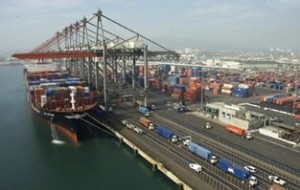 As acknowledged during the annual CALSTART annual meeting and awards presentations, facing air pollution at freight corridors and ports is a serious challenge. Workers and local residents are prone to serious health hazards including asthma, lung cancer, and emphysema from toxic air pollutants. It is getting better at the ports of Los Angeles and Long Beach and the entire southern California region; the cancer risk has dropped 65% since 2005, but it’s still considered to be too high and one of the worst in the nation. Incentive programs and cleaner fuels have slashed diesel emissions from trucks, ships, and other vehicles. For anyone living and working near the ports, there continues to be a strong demand for air quality to get better.
As acknowledged during the annual CALSTART annual meeting and awards presentations, facing air pollution at freight corridors and ports is a serious challenge. Workers and local residents are prone to serious health hazards including asthma, lung cancer, and emphysema from toxic air pollutants. It is getting better at the ports of Los Angeles and Long Beach and the entire southern California region; the cancer risk has dropped 65% since 2005, but it’s still considered to be too high and one of the worst in the nation. Incentive programs and cleaner fuels have slashed diesel emissions from trucks, ships, and other vehicles. For anyone living and working near the ports, there continues to be a strong demand for air quality to get better.
Two meetings in the Los Angeles area last week gave me some hope for the future of clean transportation at the largest port area in the US. On Monday afternoon, PortTech Los Angeles, a non-profit organization funded by the Port of Los Angeles, held its annual open house meeting. Guests were able to see PortTech’s expanded office facilities and view table displays from startups in PortTech’s newest portfolio of companies. Like LA Cleantech Incubator, PortTech helps cleantech entrepreneurs go from early startups to thriving businesses. Member companies are in a good place to support PortTech’s vision of advanced, clean technologies serving the port community.
One of the displaying companies, Transpower, is manufacturing battery-electric drive systems for Class 8 trucks. The electric drive system offers lower lifecycle costs than diesel engines and is well suited for port drayage trucks, local delivery trucks, and refuse collection vehicles. NorthSouth GIS LLC (NSG) designs and deploys geospatial systems for ports. The company integrates these systems with other port systems, populates them with data, devises processes, and trains personnel with a focus on long-term sustainability. In September during the 5th annual PortTechEXPO, cleantech companies were able to connect with business prospects at Southern California’s ports and explore opportunities with ports worldwide working to achieve a more sustainable future.
Another meeting last week focused on a test project for cargo trucks serving the ports. On Thursday, the e4 Mobility Alliance, which is managed by the Los Angeles County Economic Development Corp., hosted a meeting featuring Dennis Rodriguez, the Southern California account manager for Siemens. Rodriguez gave a presentation on electric trucks participating in a test project in Carson, Calif. Siemens is providing electric drive systems that will operate on a catenary system, similar to what you see powering metro buses in San Francisco and other cities. Along with the overhead external conductive box and cable system that Siemens is providing, Volvo Trucks is supplying test freight carrier trucks.
For Siemens, this technology has proven to be safe and efficient; trucks participating in previous tests have been able to perform at maximum weight loads and speeds. “Road freight emissions has become a big deal at ports,” Rodriguez said.
This project with its mile-long path in Carson, is the first part of a multi-phase project Siemens is seeking support for. South Coast Air Quality Management District is providing funding for this project that will start up next year. Siemens is hoping that its catenary system could be part of a dedicated single lane within 710 freeway’s corridor project set to start up in the next five years. That 12-mile project is still seeking buy-in from cities along that stretch of the freeway and government agencies overseeing the region. The concept is to launch the corridor project in 2020 and complete it in 2030; it’s expected to create 500,000 project jobs and to help reduce harmful emissions.



